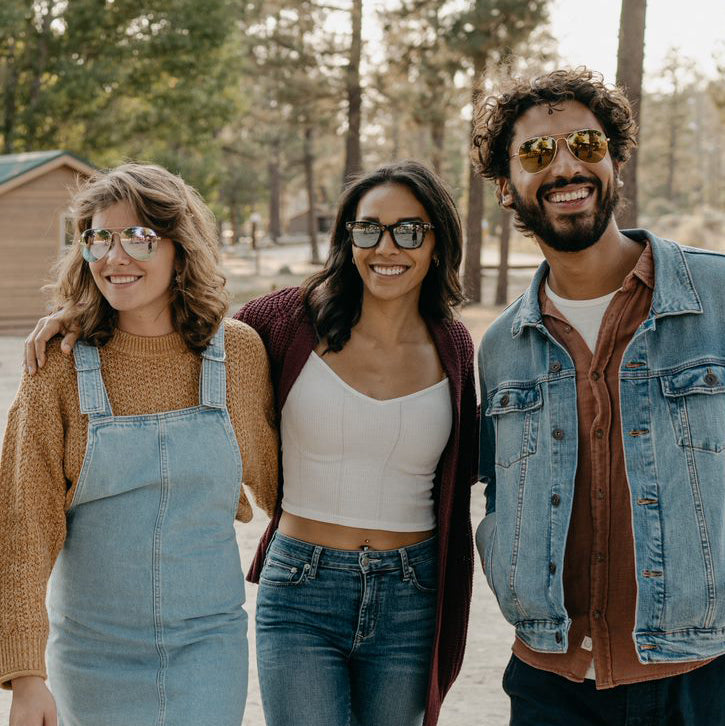
Getty Images
10 Essential Items To Pack for Your Next Camping Trip
July 5, 2019
If you’re a disciple of Ray Mears or Bear Grylls, you might believe that all you need to enjoy a stay in the wild is a length of parachute cord and a positive attitude. That theory will last until the first rain shower, missed breakfast, or sleepless night. Whether you’re heading to the desert, the mountains, or the forest, it’s the kit that puts the comfort in camping. Let’s assume a tent, backpack, and sleeping bag as standard. Next, make sure you also include these 10 camping essentials for a successful trip.
1. Something to Sleep On
The time to discover that the ground is hard and cold should not be 3 a.m. A sleeping bag provides minimal cushioning. Unless you want to feel every stone, twig, and root digging into your body, take a roll-up or inflatable mattress to sleep on. They also form a thermal barrier to stop the ground from drawing away your body heat. Throw in an inflatable pillow for sweeter dreams.

2. Lights for Your Camp
Nature will provide the moon and the stars, but you’ll need more to see your dinner or, say, check for scorpions if you’re in the desert. Go for an LED flashlight or hands-free head torch for a bright beam that’s easy on battery life. Clip a bulb inside your tent, too, so you’re not fiddling around for zippers and laces when it’s time to turn in.

3. Bug Repellent
You’re spoiled for choice when it comes to camping spots. You’ll be overwhelmed with options when it comes to bugs, too. Each environment has its own speciality, from mosquitoes around water and midges or ticks in the forest to sand flies on the beach. Pack a potent repellent to keep the bugs at bay, preferably a natural, DEET-free spray that is harmless to humans.

4. Garbage Bags
Wherever you go, the idea is to leave no trace. That means hiking out with everything you hiked in with, either in your backpack or in a garbage bag. A few extra bags will also come in handy—as an emergency poncho, for example, or a backpack cover, waterproof groundsheet, or water container.

5. First Aid Kit
Arguably the first item that should go into your backpack, your first-aid kit should contain painkillers, antiseptic wipes, band aids, and creams to handle the typical challenges that the outdoors will throw at you. You might not plan on getting blisters, sunburn, or insect stings, but with a first-aid kit in your pack, at least you’ll have a plan.

6. Sun Protection
Getting out in the open is a liberating experience, but not all parts of your body will welcome the exposure. If you’re in the desert or on the coast, sunglasses and a cap or hat are not just for comfort. They’re essential protection against UV rays, heat stroke and sunburn. Take a leaf out of Saharan desert nomads and choose loose, breathable fabrics to keep the sun off the skin while allowing sweat to evaporate.

7. Travel Wash Kit
When you’ve been walking on the trail all day or picking up salt and sand from the ocean, there’s no guarantee of a hot shower waiting for you before bedtime. Pack a small wash kit with light, compact essentials, including soap and a washcloth, so you can refresh yourself completely with just a mug of water. Take a microfiber travel towel too. It dries you and itself quickly, so you don’t have to lug a funky towel around with you for the rest of your trip.

8. Power Pack
For many people, the difference between a camping trip and a survival situation is that you get to take your smartphone. But if you’re listening to music on your hike and hitting your selfie targets on the way, your battery will be the first to give up. Bring a portable power pack to charge up your essentials once you reach camp. Most will give you a couple of full charges, and some even let you hook up to solar power.

9. Water Bottle and Filter
If you’re confident that you’re adequately prepared with regard to hydration, you can throw yourself totally into hiking, kayaking, or cycling to camp. Carry as much water as possible in bottles, canteens, and camel packs. If you know you’re heading somewhere with a water source, you can get away with some purification tablets or a Lifestraw for filtering out the gunk and bacteria.

10. Lightweight Stove
In a perfect world, you’ll be gathering around a campfire or fire pit at night, telling stories and toasting marshmallows. That, however, won’t be allowed in many National Parks, campsites, or forests, particularly during summer. If you do want to heat food, boil water, or brew a quick cowboy coffee, pack a lightweight fuel stove such as the Jetboil, which packs inside its own cooking pot.

The more you camp and the more time you spend around those who live for the wilderness, the more you’ll appreciate the difference simple items—or the lack thereof—can make. Having the right basic equipment also helps you avoid overpacking. The above items will all fit into a medium-size day pack and will keep you in comfort for a few days or more. Put your trust in this essential packing list and you’ll surprise yourself with how little you need to go a long way.
Written by Nick Marshall for Knockaround.





3 Awesome Places to Visit in Southeast Asia
Thinking of Getting a Dog? Here’s What to Consider First